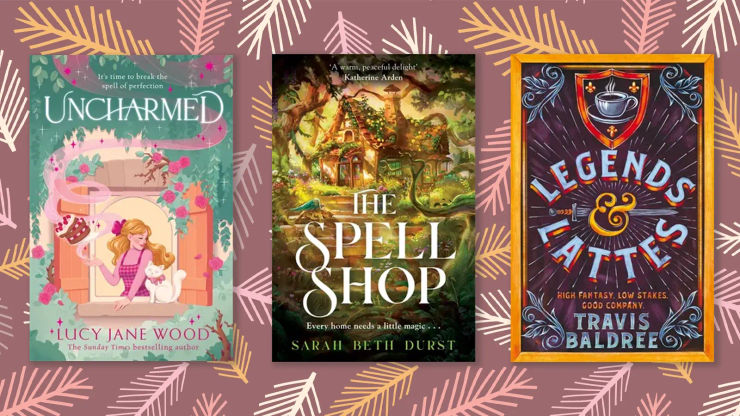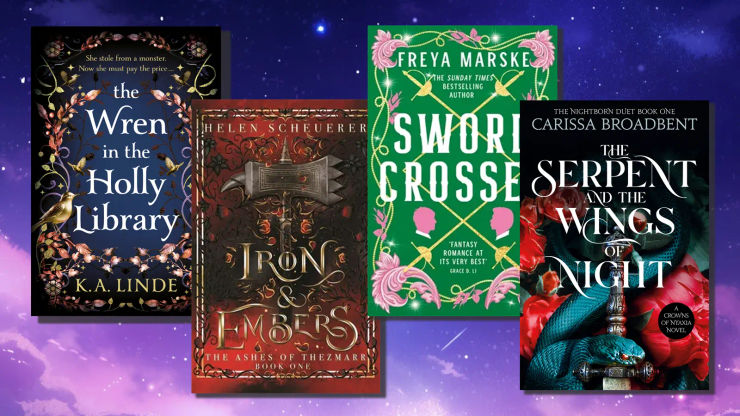How to move from self-publishing to traditional publishing
Cosy fantasy author, Rebecca Thorne, answers your questions about traditional versus self-publishing.

"More and more publishers are focusing on 'hybrid' authors like me – ones who straddle the lines between traditional and self-publishing." Rebecca Thorne, author of Can't Spell Treason Without Tea discusses her experience, and shows that there's no right way to write and publish a book.
Can you traditionally publish after you’ve self published?
An old rule of thumb for authors was if you self-published, you couldn’t publish traditionally with a big publishing house later – just by pressing 'publish' on Amazon, they blew their chances of a big press picking it up later. Same on the opposite side of the spectrum with traditionally published authors – you were labeled a 'trad' author and stayed in that lane your entire career.
But as technology improves and new channels open to self-published authors, I’m pleased to say that this rule is obsolete.
In fact, more and more publishers are focusing on 'hybrid' authors like me – ones who straddle the lines between traditional and self-publishing.
How did you break into traditional publishing?
I’m a big proponent of authors pursuing self-publishing, especially as an odd way to break into traditional publishing later.
‘I’m a big proponent of authors pursuing self-publishing, especially as an odd way to break into traditional publishing later. ’
I spent eight years pursuing traditional publishing, getting the agent and going on submission with multiple books. I was rejected at every turn. So I let go of my traditional publishing dream and focused on the beautiful side of self-publishing: owning my creativity, personally connecting with my audience, talking about whatever I wanted on social media, designing my book covers, etc. I also worked really hard at everything around the books as well. Publishing is a business on either side of the fence, and self-published authors have to get good at marketing themselves, pursuing commercial viability, self-editing, etc. Whether I succeeded or failed was my choice, and that was freeing.
And I did succeed. And this got attention.
A successful self-published author's products – their books – are proven, with established sales numbers a publisher can reference while making an offer. These books and authors come with a built-in audience. Basically, it’s a safer purchase for a publisher.
When Tor UK expressed interest in purchasing my book, signing the deal was a no-brainer to me. Tor had long-since been my dream publisher; they published all of my favorite fantasy novels. My publishing story is unique, but hybrid authors are becoming more commonplace. It’s a smart business move for publishers to buy established self-published novels.
Now, does it mean your self-published book is guaranteed to sell to a big publisher? Probably not. But every time you secure a new reader, your chances grow.
And in the meantime, you get to enjoy self-publishing. It truly is one of the greatest facets of this industry: connecting with authors and readers, finding new ways to advertise, taking complete control of your books and their futures. You’re not waiting for an editor to say 'yes.' You’re saying 'yes' to yourself.
Even with that, the move to traditional publishing has been nothing short of a dream for me. I still self-publish when I can, but I can confidently say I’ve never worked with a more passionate team of amazing individuals than at my publisher. My time with Tor and Pan Macmillan has drastically expanded my knowledge of the publishing industry, and I’m incredibly grateful for the opportunity.
Don’t enter self-publishing with the goal of being traditionally published; you’ll likely be disappointed. But you can keep it as an aspiration, and get your author name established in the meantime. Start earning royalties. Network anywhere you can.
And if one of your books hits it big – keep an eye out for interesting emails from traditional publishers.
What are the hidden costs of self-publishing?
I spent $2100 [~£1700] of my own money publishing my first cosy fantasy, Can’t Spell Treason Without Tea. I needed to buy ISBNs, formatting software, commercial rights for a cover image, and a dozen other things. After publication, I was lucky to meet wonderful booksellers on social media who stocked my book in their stores – but the process for obtaining print-on-demand books is complicated, and the wholesaler discount meant my royalties dropped to a few cents a sale. As if that wasn’t enough, managing a social media presence to sell books takes a lot of time. I posted multiple times a day for over a year on both TikTok and Instagram, and that’s tiring.
What are the limitations of self-publishing?
I adore self-publishing, but it just can’t compete on some things.
‘Bigger publishers have something authors alone can never get: distribution lines.’
Bigger publishers have something authors alone can never get: distribution lines. They have the production capabilities to print hundreds of thousands of books, the warehouses to store those books, and the shipping lines to stock them in bookstores around the world.
Final thoughts . . .
There is no 'right' or 'wrong' path to publication. Anyone telling you otherwise is posturing–pretending to know more than they do. Both paths have merits and both paths have their risks.
‘There is no 'right' or 'wrong' path to publication . . . Both paths have merits and both paths have their risks. ’
My rule of thumb is that if you have one book you’re thrilled to sell, you desire to work with a big team of professionals, and you’re okay waiting a long time (years, usually) for payment, traditional publishing is your fit.
If you write fast and well, don’t mind rolling up your sleeves, and can stomach the upfront cost, self-publishing is a great option.
The best path is to get out there and experiment. As I’ve proven, you never know which path might stick–and sometimes one path can lead to the other. The 'rules' of publishing are more like guidelines, anyway.
Can't Spell Treason Without Tea
by Rebecca Thorne
Reyna, the private guard to the queen, and Kianthe, the most powerful mage in existence, have one wish, and that’s to open a cosy little bookshop where folk can drink tea before an open fire, surrounded by plants and company while reading their favourite books. However, furious monarchs, magical creatures, and the citizens of Tawney all have other ideas. Combining high stakes with cosy fantasy, this hugely anticipated read wraps sapphic representation, healthy relationships, powerful women and comfortable fireside chats into a warm hug of a story. With dragons. Don’t forget the dragons.






